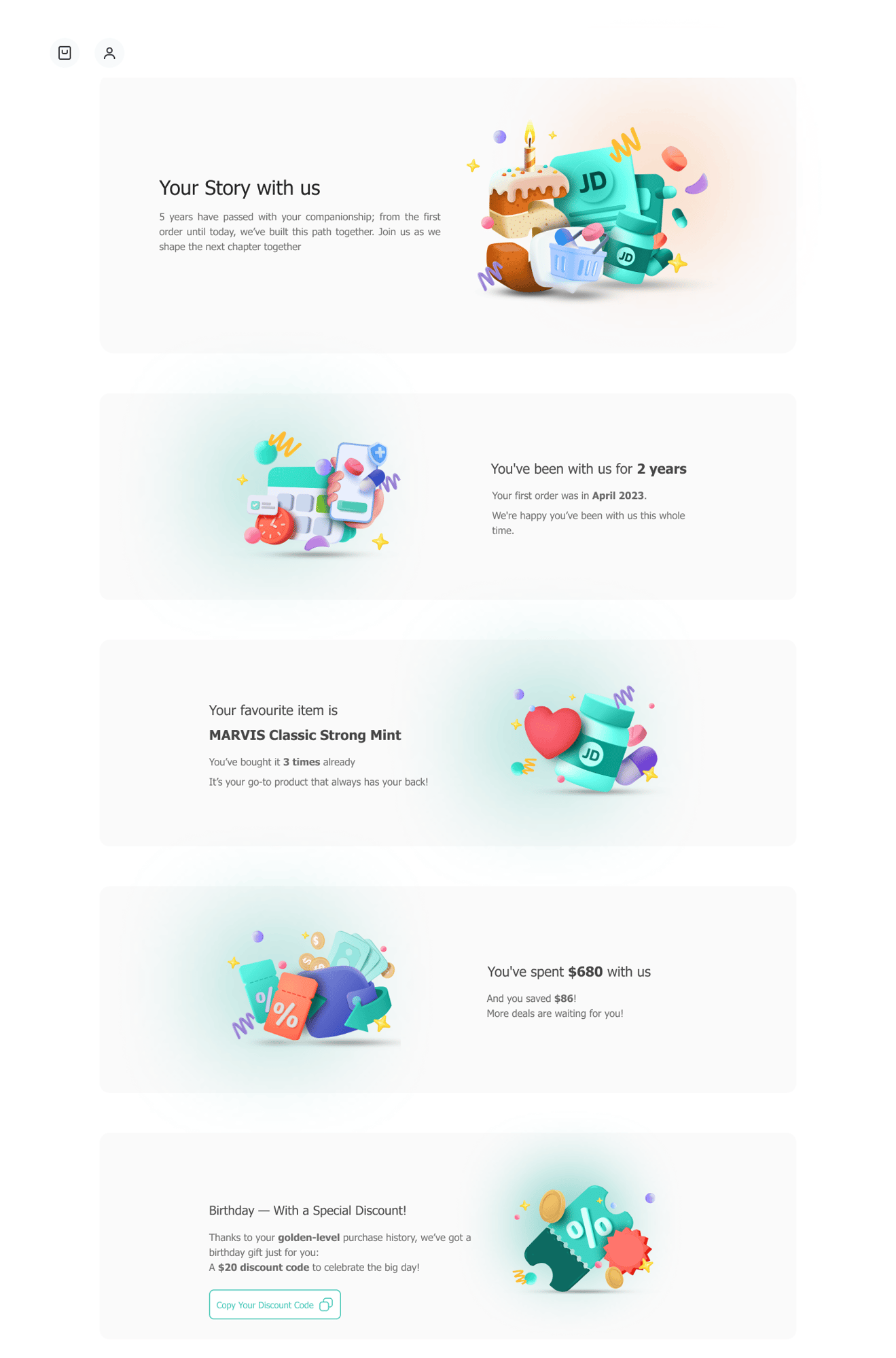Personalize Your Store.
No Developer Needed.
Show each visitor personalized messaging and images based on who they are, what they're browsing, and what's in their cart. Watch conversion rates jump 10-30% in 90 days.
Loading...
Turn data from Klaviyo, Shopify & more into personalization power.






You're in charge of increasing conversion
You're managing multiple audiences on your Shopify site with a lean marketing team and a dev queue that's months long. The frustrating part? You have the data that could help. Purchase history, email engagement, loyalty status, quiz responses. You know what would resonate with each segment. But it's all scattered across different platforms, and you can't use it on your site without tying up developers. If only you could connect it all and personalize your site automatically, without a developer...
Make your site speak directly to every visitor
Case Study
21% Conversion Boost: Personalized Anniversary Campaign
Results
- 21% increase in conversion rate
- 52% higher click-through rate vs. standard campaigns
- Drove repeat purchases through personalized credit rewards
Challenge
A health & wellness e-commerce brand wanted to celebrate their 5-year anniversary with personalized experiences but lacked the tools to execute at scale.
Solution
Using Growcado's personalization platform, they created interactive "Your Story With Us" pages that displayed each customer's unique journey. Tenure milestones, first purchase date, favorite products, purchase frequency, total savings, and tiered anniversary credits based on lifetime spend.
The Repeat Purchase Driver
Customers received personalized discount codes tied to their loyalty tier "You've saved $86 with us here's $20 off your next order". This turned a brand moment into immediate revenue, bringing customers back to convert.
Data Implementation
Growcado transformed existing customer data into individualized visual experiences, no additional data collection required.

Get the most out of your metrics
-
Outside impact
-
Customizable
-
Flexible criteria
-
Big picture
45% more qualified leads because customers trust you
Lorem ipsum dolor sit amet, consectetur adipiscing elit, sed do eiusmod tempor incididunt ut labore et dolore magna aliqua. Ut enim ad minim veniam, quis nostrud exercitation ullamco laboris nisi ut aliquip ex ea commodo consequat. Duis aute irure dolor in reprehenderit in voluptate velit esse cillum dolore eu fugiat nulla pariatur. Excepteur sint occaecat cupidatat non proident, sunt in culpa qui officia deserunt mollit anim id est laborum.
45% more qualified leads because customers trust you
Lorem ipsum dolor sit amet, consectetur adipiscing elit, sed do eiusmod tempor incididunt ut labore et dolore magna aliqua. Ut enim ad minim veniam, quis nostrud exercitation ullamco laboris nisi ut aliquip ex ea commodo consequat. Duis aute irure dolor in reprehenderit in voluptate velit esse cillum dolore eu fugiat nulla pariatur. Excepteur sint occaecat cupidatat non proident, sunt in culpa qui officia deserunt mollit anim id est laborum.
45% more qualified leads because customers trust you
Lorem ipsum dolor sit amet, consectetur adipiscing elit, sed do eiusmod tempor incididunt ut labore et dolore magna aliqua. Ut enim ad minim veniam, quis nostrud exercitation ullamco laboris nisi ut aliquip ex ea commodo consequat. Duis aute irure dolor in reprehenderit in voluptate velit esse cillum dolore eu fugiat nulla pariatur. Excepteur sint occaecat cupidatat non proident, sunt in culpa qui officia deserunt mollit anim id est laborum.
45% more qualified leads because customers trust you
Lorem ipsum dolor sit amet, consectetur adipiscing elit, sed do eiusmod tempor incididunt ut labore et dolore magna aliqua. Ut enim ad minim veniam, quis nostrud exercitation ullamco laboris nisi ut aliquip ex ea commodo consequat. Duis aute irure dolor in reprehenderit in voluptate velit esse cillum dolore eu fugiat nulla pariatur. Excepteur sint occaecat cupidatat non proident, sunt in culpa qui officia deserunt mollit anim id est laborum.
Need clarification?
What is T2D3?
Lorem ipsum dolor sit amet, consectetur adipiscing elit, sed do eiusmod tempor incididunt ut labore et dolore magna aliqua. Ut enim ad minim veniam, quis nostrud exercitation ullamco laboris nisi ut aliquip ex ea commodo consequat. Duis aute irure dolor in reprehenderit in voluptate velit esse cillum dolore eu fugiat nulla pariatur.
Can I use T2D3 on my phone?
Lorem ipsum dolor sit amet, consectetur adipiscing elit, sed do eiusmod tempor incididunt ut labore et dolore magna aliqua. Ut enim ad minim veniam, quis nostrud exercitation ullamco laboris nisi ut aliquip ex ea commodo consequat. Duis aute irure dolor in reprehenderit in voluptate velit esse cillum dolore eu fugiat nulla pariatur.
Can I change my plan later?
Lorem ipsum dolor sit amet, consectetur adipiscing elit, sed do eiusmod tempor incididunt ut labore et dolore magna aliqua. Ut enim ad minim veniam, quis nostrud exercitation ullamco laboris nisi ut aliquip ex ea commodo consequat. Duis aute irure dolor in reprehenderit in voluptate velit esse cillum dolore eu fugiat nulla pariatur.
What is so great about the Pro plan?
Lorem ipsum dolor sit amet, consectetur adipiscing elit, sed do eiusmod tempor incididunt ut labore et dolore magna aliqua. Ut enim ad minim veniam, quis nostrud exercitation ullamco laboris nisi ut aliquip ex ea commodo consequat. Duis aute irure dolor in reprehenderit in voluptate velit esse cillum dolore eu fugiat nulla pariatur.
Plans
Pricing
PRO
$99/mo
Up to 1,000 orders per month
Up to $1M Annual Store Revenue
-
 Unlimited Campaigns
Unlimited Campaigns
-
 Free Implementation
Free Implementation
-
 Shopify Integration
Shopify Integration
-
 Klaviyo Integration
Klaviyo Integration
-
 UTM and Geolocation Targeting
UTM and Geolocation Targeting
-
 Scheduling Capabilities
Scheduling Capabilities
-
 Email & Chat Support
Email & Chat Support
-
 Dedicated Customer Success Manager
Dedicated Customer Success Manager
-
 White Glove Service
White Glove Service
GROWTH
Talk To Us
Over +1,000 orders per month
Over $1M Annual Store Revenue
-
 Unlimited Campaigns
Unlimited Campaigns
-
 Free Implementation
Free Implementation
-
 Shopify Integration
Shopify Integration
-
 Klaviyo Integration
Klaviyo Integration
-
 UTM and Geolocation Targeting
UTM and Geolocation Targeting
-
 Scheduling Capabilities
Scheduling Capabilities
-
 Email & Chat Support
Email & Chat Support
-
 Dedicated Customer Success Manager
Dedicated Customer Success Manager
-
 White Glove Service
White Glove Service
FAQs
Have questions?
What is Growcado, and how does it help my business?
Growcado is a no-code personalization platform that connects your existing customer data—from Shopify, Klaviyo, and other tools—to personalize your store for every visitor. Without needing a developer, you can show targeted messaging and images based on who's browsing, what's in their cart, and their purchase history.
The result? Ecommerce brands typically see 10-30% conversion rate increases within 90 days, along with higher add-to-cart rates, increased average order value, and stronger repeat purchase rates. You're already sitting on valuable customer data — Growcado helps you turn it into revenue by making every visitor feel like your store was built just for them.
What data powers personalization?
Growcado uses three types of data you already have to personalize your store:
- Real-time browsing data: Location, device type, referral source (Google, Instagram, email), UTM, time of visit, and what they're currently viewing or have in their cart.
- Behavioral data: Purchase history, browsing patterns, email engagement (from Klaviyo), loyalty tier, quiz responses, and product preferences.
- Existing data: Information already sitting in Shopify, Klaviyo, your loyalty program, or other connected platforms like subscription status, total spend, VIP status, last purchase date, customer lifetime value and more.
The power is in combining them. Show a first-time visitor from Instagram different messaging than a VIP customer who's bought 5 times. All without collecting new data or writing code.
How does Growcado ensure data privacy and security?
We are fully GDPR-compliant and prioritize data privacy, ensuring that all customer data is handled securely and responsibly.
You determine what information is shared with our platform and our privacy-first architecture ensures your customer information remains protected throughout the personalization process.
Does Growcado integrate with my email platform, analytics, and other tools?
Yes, Growcado integrates with popular email providers (Klaviyo, Mailchimp, etc.), analytics platforms (Google Analytics, etc.) and customer data tools. We work with stores of all sizes. Whether you have a sophisticated tech stack or just getting started. Reach out and we'll walk you through how it works with your setup.
Do you provide implementation support or ongoing customer success?
Yes. You'll get hands-on support from day one with a dedicated team member who helps you get set up and continues as your strategic partner. They'll regularly share ideas and best practices to help you maximize revenue from personalization, whether you're just getting started or scaling up.
How fast can I launch Growcado personalization?
You can launch your first personalized experience in under an hour. More complex setups might take a few days, but you'll start seeing results immediately. Your dedicated team member will help you prioritize quick wins first, then expand from there.
How do I get started with Growcado?
Fill out your details in the form below and we'll reach out to you promptly.
We're not an e-commerce company—can your product still work for us?
Absolutely. Growcado is built to support a wide range of industries and use cases - from B2B to B2C. If you have a website or app where user engagement matters, we can help deliver personalized experiences.
